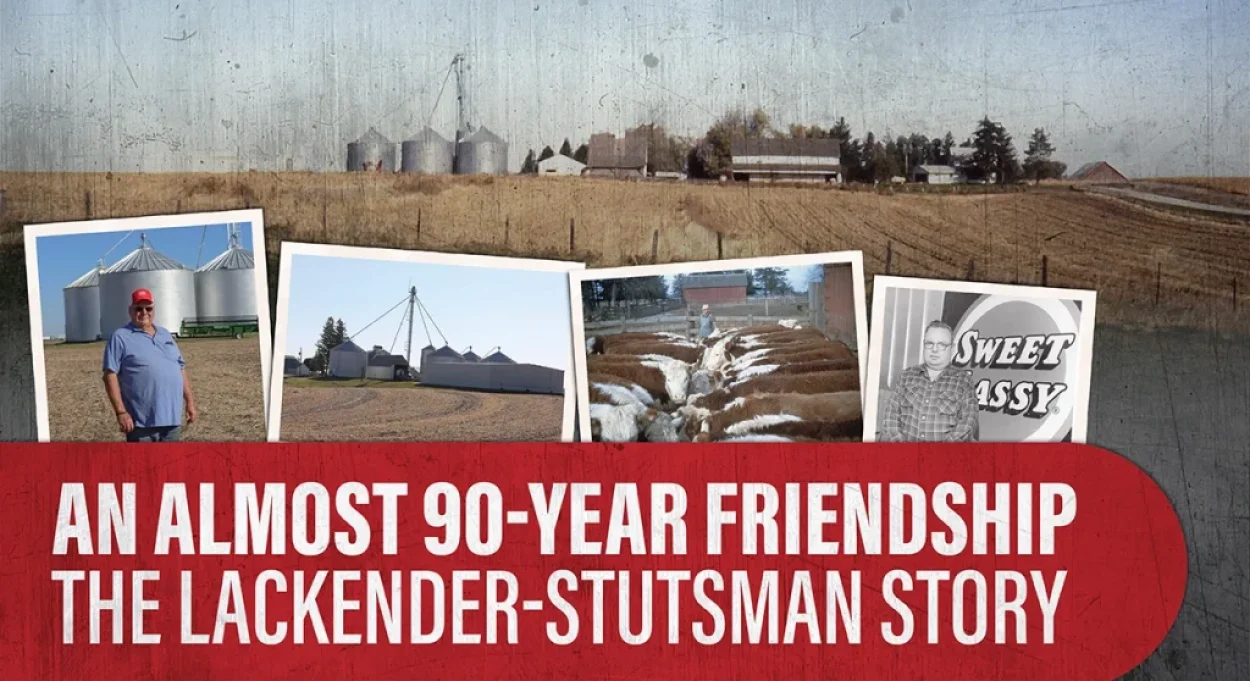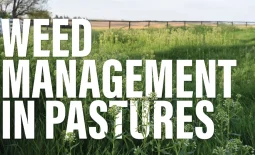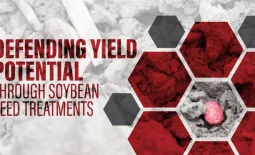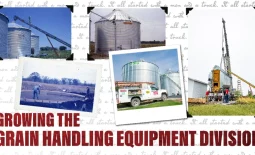An Almost 90-Year Friendship: The Lackender-Stutsman Story
In between Hills and Sharon Center, a quick eight-minute drive from Eldon C. Stutsman, Inc., nestled on a gravel road sits two farmsteads that have been next-door neighbors for almost 90 years. The first farmstead has been in semi-retired farmer and long-time Stutsman customer, Doug Lackender’s family since 1898 when his great grandfather, Abraham Lackender, bought it. The other farmstead belonged to Eldon Stutsman and remains in the Stutsman family today.
“Our histories are intertwined,” Doug Lackender said.
The Start of a Great Friendship
Doug’s grandfather, Roy Lackender, purchased the farm from Abraham in the 1920s. Roy had a herd of cattle which he loved. It was Roy’s herd of cattle that drove the start of the Lackender-Stutsman relationship (in addition to being next-door neighbors). When a representative from Schreiber Mills was making his way to give a sales pitch to Eldon Stutsman on Sweet Lassy (the first pelleted cattle feed), he landed at Roy’s farm by accident.
“They got to talking,” Doug recalled, “and Grandpa said, ‘Well, it sounds like a good product. If Eldon takes it, I’ll buy five tons of feed.’”
When the representative finally found Eldon, he was able to tout that he had already found a customer of Sweet Lassy for Eldon. Sweet Lassy would go on to become the famous cornerstone for the Stutsman feed business.
A Growing Operation
Doug’s father, Russel Lackender, eventually took over the farm from Russel’s father, Roy. A few of Doug’s earliest memories on the farm included running the tractor to get hay into the barn and cultivating corn.
While Doug described his family’s farm as a “pretty typical Iowa farm until the 1960s,” Russel was ahead of the time in the area when he started using a two-way plow to contour his fields. In the late ’60s, Russel also laid the contours on the Stutsman farm.
“He was the first I know — period — that did that conservation work in Sharon Township,” Ron Stutsman, Stutsman’s Chairman of the Board, said.
Doug joined the operation full-time in 1969. At that point, they were doing crop rotation with corn, alfalfa hay and oats. His dad also had 25 to 40 head of cattle until he made the difficult decision to sell his herd in 1974. To expand the operation, Russel, Doug and Dennis (Doug’s brother who was involved with the farm at that time) started purchasing and renting more ground in the area. They also turned to raising hogs, which they did for 25 years.
Weathering the ’80s
Like many farmers, the Lackenders were impacted by the farming downturn in the 1980s. Purchasing 100 acres in 1979 made it especially challenging.
After visiting the bank, Doug recalled asking his father, “What are we going to do?” To which, he replied, “We’re going to work hard and if we lose it, we’ll go do something else. If we don’t, we’ll get through it.”
Russel tasked Doug with becoming their grain marketer, so he worked with a group to learn how to merchandise grain and better use the grain setup they had on the farm. Doug noted learning how to cover costs and hedge grain was a turning point for them in keeping their operation going during the tough times of the Farm Crisis.
“Everybody suffered in the ’80s, but we just buckled down and got through it — with the help of Stutsmans and Hills Bank,” Doug remarked. “I’m pretty proud of that fact.”
Ron Stutsman described the Lackenders as a “generation of farmers that survived the good and tough times in the ’80s. They were survivors.”
In 1988, Russel was diagnosed with Parkinson’s disease, placing more of the farm work on the shoulders of Doug and Doug’s sister, Janet Wilson.
“I don’t want to sound like the lone ranger; my sister helped me with a lot,” Doug said.
More than Neighbors
Growing up next door to Eldon Stutsman, his wife, Dorothy, and their six children, Doug recalled stopping by the Stutsman farmstead for a snack on his walk home from the schoolhouse just a little further down the road.
“I’d walk by their place twice every day,” Doug said. “I think I was a pest, but Dorothy had a toaster, and I would stop every day on the way home from school until my mother said, ‘Doug, you don’t live there!’”
It’s safe to say the Stutsmans and the Lackenders were (and still are) pretty good friends. This relationship carried into the Lackenders trusting Stutsmans with their feed and fertilizer needs as well as building and maintaining their grain handling system. Doug also participated in the original agronomic data analysis program we offered, HighQ.
“Russel was a loyal customer and good neighbor,” Scott Stutsman, Stutsman’s CEO, remarked.
Ron Stutsman echoed this sentiment and said, “You could never, ever ask for better neighbors. We did so many things together.”
On the Cusp of Conservation
The Lackenders converted their ground to a no-till system in the ’90s, a decision Doug said was a result of wanting to cut fuel costs from doing heavy tillage.
“I’m not saying we were the first one, but we were always kind of ahead of the curve a little bit on that kind of stuff,” said Doug.
While they experienced some yield drag from converting to no-till, Doug said they were eventually able to figure it out.
In 1999, the Lackenders reached their peak amount of owned and rented land. Their landowners were also fans of the no-till system because they knew their land was being taken care of. Doug practiced no-till on the ground he farmed until 2012.
Easing Into Retirement
Around 2012, Doug decided it was time to either expand the operation by adding a hired man and renting more ground or start easing into retirement. Doug chose the latter option and is semi-retired alongside his wife, Jo, who is retired from Rockwell Collins. Currently, Doug rents his farm on a crop share basis with Black Diamond Farms (Dave and Ben Schmidt).
“I guess I chose semi-retirement,” Doug said. “I still own my own machinery. I rent the farm right across the road from us, and I have a little bit of corn to combine, a little bit of beans to combine and then, I help the Schmidts if they need me.”
Doug hopes to leave his farm to his daughters and their families someday.
A Continued Friendship
Even though Doug has fewer farming responsibilities, the Lackender and Stutsman relationship continues today with younger generations of both families. Doug volunteers his pasture up to Eldon’s great-grandson, Logan Stutsman, to use for his sheep. The return … taking care of the Lackender’s cats when they’re away.
“It’s just like family,” Doug said.
The Lackenders and the Stutsmans have been getting along for almost 90 years. We are fortunate to continue to have the Lackenders as loyal customers, friends and neighbors.
“We are great friends and neighbors,” Ron said. “I can’t say anything more positive about anybody than I can about them.”










